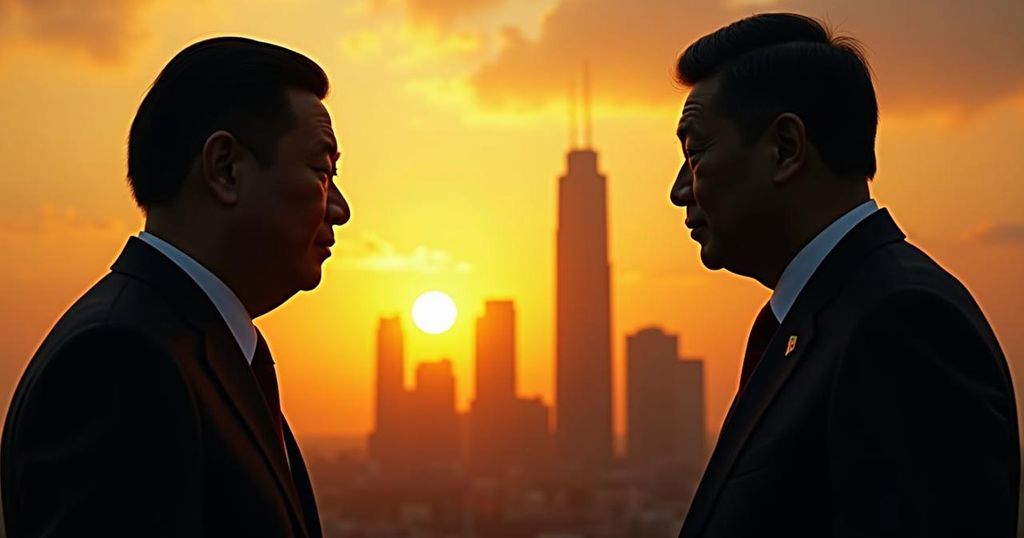China and Brazil are advocating for a peace plan to resolve the Ukraine conflict, claiming backing from 110 nations, but face strong opposition from Ukrainian President Zelenskyy. The plan has been criticized for neglecting Ukraine’s territorial integrity and has incurred skepticism from the U.S. The discussions occurred during a meeting at the UN General Assembly, attended by representatives from multiple countries, highlighting the growing geopolitical complexities surrounding the war.
In an attempt to garner support for a proposed peace initiative aimed at resolving the ongoing conflict in Ukraine, China and Brazil are spearheading an effort to secure backing from developing nations. This move, however, has encountered resistance from Ukrainian President Volodymyr Zelenskyy, who has characterized the initiative as excessively favorable to Moscow. China has put forth a plan known as the “Six-Point Consensus,” which asserts that it has the endorsement of 110 countries. Critics have pointed out that this plan fails to mention the restoration of Ukraine’s territorial integrity, which is a core component of Ukraine’s own peace formula that emphasizes adherence to international law and necessitates the withdrawal of Russian forces, alongside the return of prisoners of war and civilian captives. The proposal was discussed during a recent meeting led by Chinese Foreign Minister Wang Yi and Brazilian foreign policy adviser Celso Amorim, which involved representatives from 17 nations taking place on the margins of the United Nations General Assembly. During this assembly, Minister Wang focused on crucial topics such as preventing the escalation of the conflict, the avoidance of weapons of mass destruction, and the protection of nuclear facilities. Wang stated, “Russia and Ukraine are neighbors that cannot be moved away from each other and amity is the only realistic option,” while advocating for a peace conference that includes both countries. Despite these dialogues, President Zelenskyy has expressed serious concerns, arguing that offering alternative peace plans only serves to empower Russia’s position in the continuing conflict. The U.S. Secretary of State, Antony Blinken, has also weighed in, highlighting apprehensions about China’s support for Russia’s military-industrial complex by stating that Chinese businesses are “taking actions that are actually helping Putin continue the aggression.” Despite such skepticism from Ukraine and the U.S., a consortium of ten nations from the Global South, including Indonesia, South Africa, and Türkiye, expressed their commitment by signing a communique aligned with the aforementioned six-point agreement originating from Brazil and China in May. Mr. Amorim confirmed that this assemblage, termed “friends for peace,” intends to convene further discussions in New York. Additionally, South Korea’s Foreign Minister Cho Tae-yul has leveled accusations against Russia regarding illegal arms trafficking with North Korea, reaffirming assertions made by multiple parties, including the U.S. and Ukraine. Minister Cho has also criticized Russia’s employment of its veto power within the United Nations Security Council, suggesting that it obstructs efforts aimed at resolving the conflict. In a firm rebuttal, President Zelenskyy has rejected the China-Brazil peace initiative, describing it as counterproductive and underscoring that any negotiations must rest upon Russian military withdrawal. He implored China and Brazil to utilize their significant influence to curtail Russian aggression, rather than endorsing inadequate peace propositions. It is worth noting that China has cultivated robust economic and political relations with Russia, providing indirect support without overt military assistance, but recent reports indicate an intensification of military-technical collaboration between the two nations, thereby illuminating an increasingly strategic partnership despite Beijing’s claims of neutrality.
The conflict in Ukraine, which commenced in 2014 with Russia’s annexation of Crimea, has escalated into a full-scale war since February 2022. The situation has incited a multitude of international responses, from sanctions against Russia to military support for Ukraine. In this context, various nations have proposed peace initiatives, with differing levels of engagement and support. China’s involvement highlights its growing geopolitical ambitions and its attempts to position itself as a mediator in global conflicts, particularly those involving its ally, Russia. Brazil’s participation indicates a willingness from developing nations to engage in peace efforts, even as significant skepticism remains regarding the effectiveness and motivations behind such proposals, particularly from affected nations like Ukraine.
In summary, the peace initiative led by China and Brazil to address the conflict in Ukraine has provoked significant tension, particularly from Ukrainian leadership who perceive the proposal as insufficiently supportive of their territorial integrity. Despite claims of broad international support, skepticism remains among major stakeholders, including the United States, which fears that such initiatives could inadvertently strengthen Russian resolve. The evolving nature of global alliances and the positions of various nations will play a crucial role in shaping the ongoing dialogue around this critical geopolitical issue.
Original Source: euromaidanpress.com






